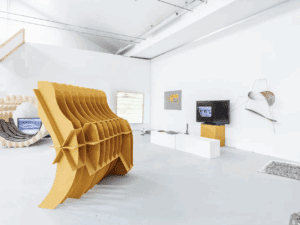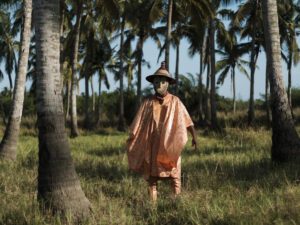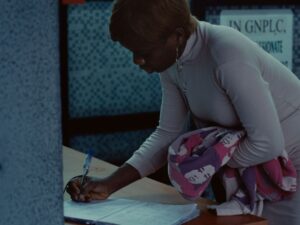The Aesthetica Art Prize 2025 has announced its winners alongside the landmark exhibition Future Tense: Art in the Age of Transformation at York Art Gallery. Together, these presentations insist on arts role as a catalyst for reflection, resistance and resilience at a moment of global upheaval.
This year’s Main Prize is awarded to Tobi Onabolu for Danse Macabre, a work that is as expansive as it is intimate. Onabolu, a London-born artist-filmmaker and writer based in Grand Popo, Benin Republic, approaches artmaking as a site of healing and renewal. Danse Macabre explores spirituality, mental health and the human psyche through a layered choreography of sound, text and movement. Dancers, singers and unseen voices converge in a portrait that oscillates between the conscious and unconscious, creating a visceral sense of catharsis. At its centre, Yoruba Egúngún masquerades embody ancestral memory and energy, connecting the work to living traditions of spirituality and performance. Onabolu’s practice synthesises diverse references: Yoruba ritual, European cinema, experimental music. The result is a constellation of gestures and sounds that draw from multiple geographies and timelines. Danse Macabrebecomes not only a performance but also a meditation on resilience and transcendence. In a contemporary climate where mental health is increasingly foregrounded, Onabolu reframes these conversations through a spiritual lens, offering a vision of art as a means of expanded awareness.
The Emerging Prize is awarded to Sam Metz for Porosity, a sculptural installation shaped by lived experience. Metz, a neurodivergent artist with ocular albinism, translates sensory perception of the Humber Estuary into bright yellow structures that refract and reflect light. For Metz, sculpture is a non-verbal language – a medium through which embodied experiences of disability and chronic pain find expression. Porosity resists the notion of sculpture as fixed or immutable; instead, it embraces difference as both method and message. By incorporating the nuances of perception, movement and sensory sensitivity, Metz challenges us to reconsider what sculpture can communicate. The work is an act of translation – from lived experience into form – and a radical reimagining of how disability informs artistic practice. Porosity insists that embodiment is not limitation but possibility, a site of invention.
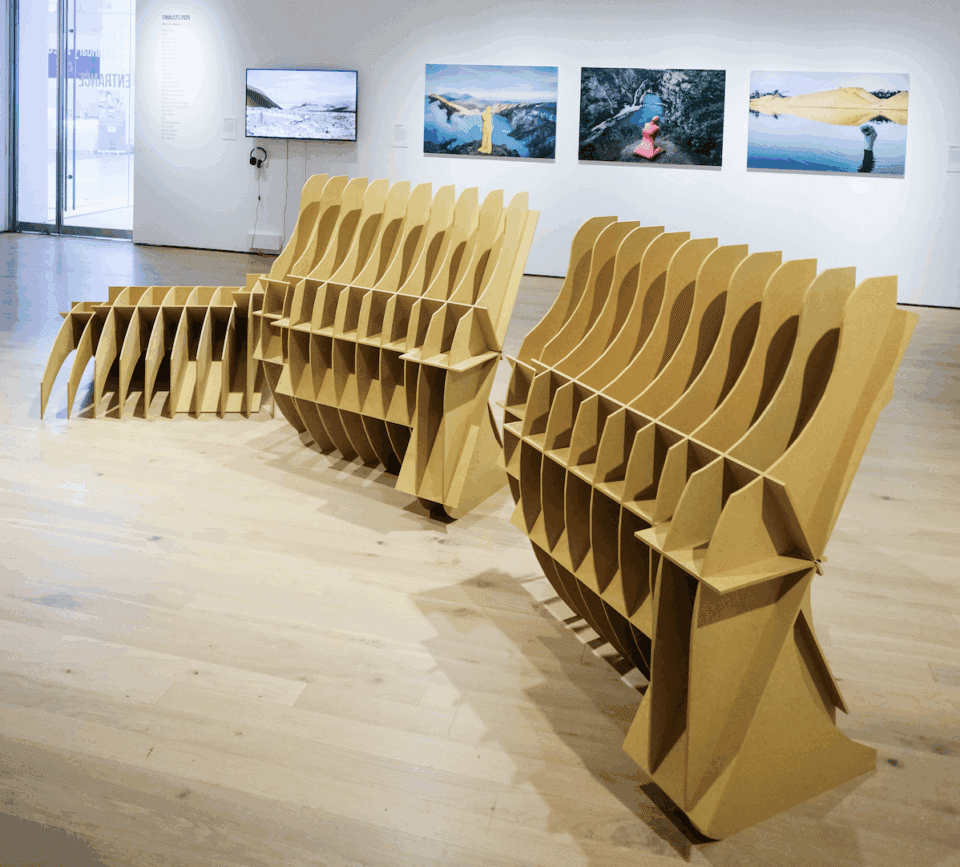
Both Onabolu and Metz are featured in the Aesthetica Art Prize Exhibition 2025 at York Art Gallery. The exhibition brings together 25 shortlisted artists, representing a global cross-section of contemporary practice. From installations probing migration and displacement to works interrogating ecological fragility and the entanglement of humans and technology, the show underscores the urgency of art in turbulent times. Àsìkò examines migration and cultural memory in New World Giants, while Hussina Raja’s STATION traces South Asian and Caribbean heritage in London. Joanne Coates’ multi-part installation The Object, Pen with Tattoo, The Portrait and The Vinyl reflects on working-class landscapes in rural England. Rayvenn D’Clark’s sculptural Untitled challenges conventional representations of Black anatomy, while Vlad Hyrnko’s Foundation interrogates the still life in a digital era. Collaborative work Time Pops Like Chewing Gum by Adam Cain, Lois Macdonald, and Princess Arinola Adegbite explores AI, technology, and disconnection. Bart Nelissen’s Datascapes examines pattern recognition in contemporary society, while Ellie Davies and Liz Miller Kovacs respond to ecological fragility and the evolving relationship between humans and land. Collectively, these works present a vivid, multidimensional portrait of contemporary practice, reflecting both urgent global concerns and formally inventive approaches.
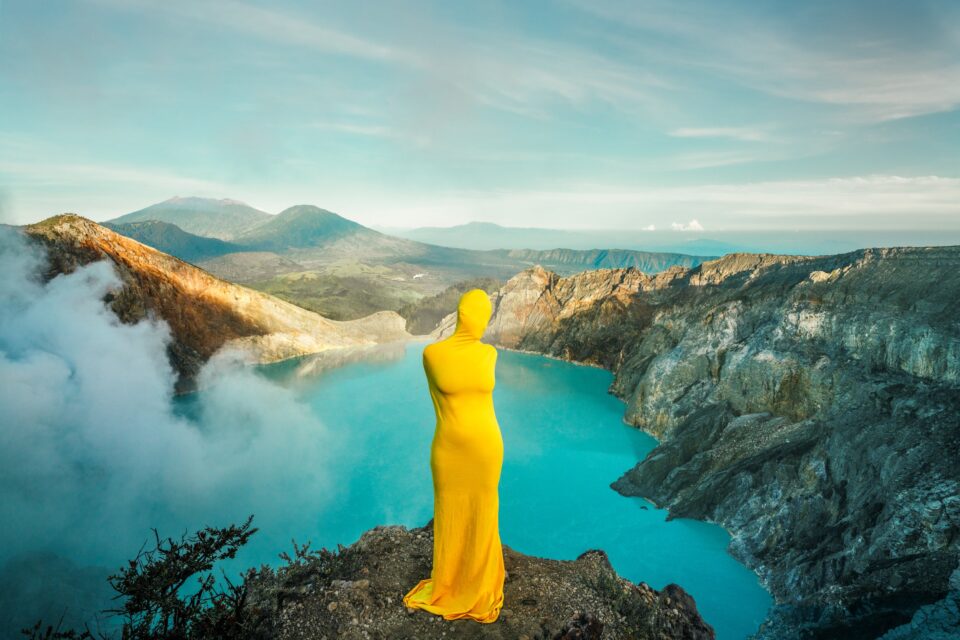
Running parallel is Future Tense: Art in the Age of Transformation, a major presentation of immersive works by Liz West and Squidsoup – both alumni of the Prize who have since gained international acclaim. Squidsoup’s Submergence engulfs viewers in an ocean of 8,000 responsive LEDs, collapsing the distinction between digital and physical space. Light becomes matter and presence becomes participation. In contrast, Liz West’s Our Spectral Vision surrounds audiences in a radiant chromatic spectrum, amplifying the sensory experience of colour until it becomes almost tangible. Together, these works transform the gallery into a site of wonder, reminding us that immersion can be both aesthetic and philosophical.
The resonance between Future Tense and the Aesthetica Art Prize exhibition is deliberate. Since its inception in 2007, the Prize has been a springboard for artists whose practices interrogate the conditions of contemporary life. Thousands have been recognised, with alumni including Larry Achiampong, Jenn Nkiru, Julia Fullerton-Batten, Liz West, and Squidsoup. Each edition amplifies voices that are not only redefining artistic form but also shaping cultural discourse on a global scale.
Cherie Federico, Director of Aesthetica and Curator of Future Tense, reflects on this year’s edition: “The Aesthetica Art Prize has always been about recognising and celebrating exceptional artistic talent. This year’s winners, Tobi Onabolu and Sam Metz, exemplify the innovation, creativity, and relevance that the Prize seeks to champion. Seeing their work alongside the broader exhibition, and in the context of alumni like Liz West and Squidsoup, highlights how the Prize continues to nurture artists whose practices make a lasting impact on contemporary art both in the UK and internationally.”
What emerges from these exhibitions is not simply a celebration of artistic talent but a vital reckoning with the world as it is. We are living through a climate emergency. We are reckoning with systemic inequalities, the deep legacies of colonialism and the rise of populism. At the same time, technological acceleration – from AI to algorithms – is reshaping what it means to be human. These are the pressures of our age, and they demand that we think differently, feel deeply and act boldly. The works in the Aesthetica Art Prize Exhibition 2025 ask us to confront these realities head-on. They speak of diaspora, belonging, and fragile ecosystems; they interrogate identity and power. Crucially, they also offer visions of resilience, empathy and hope. This is art as a way of making sense of the world – not passive observation, but a framework for reflection and, ultimately, transformation.
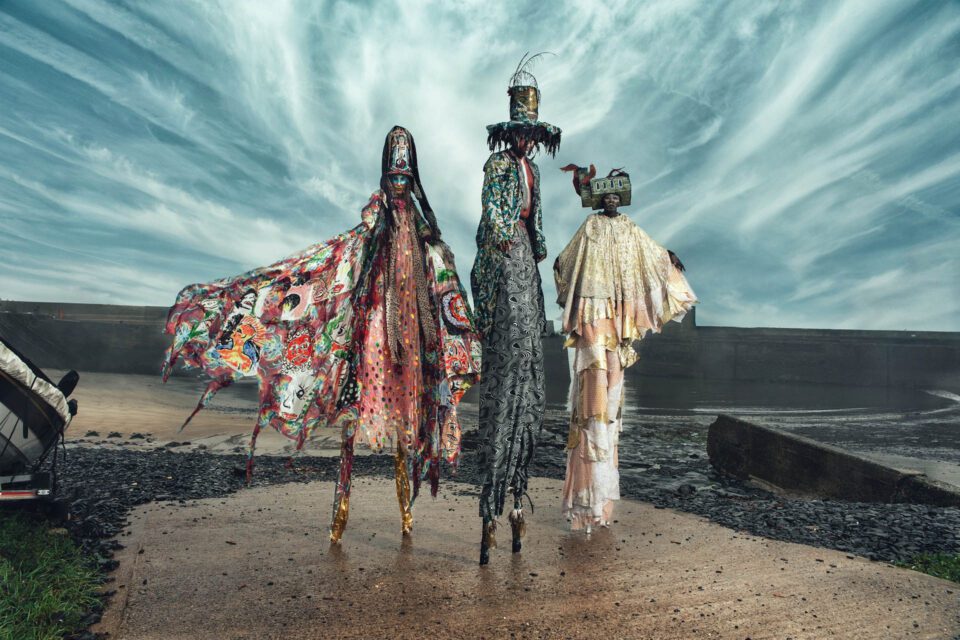
Running parallel, Future Tense: Art in the Age of Transformation looks forward. Liz West and Squidsoup harness light, colour, and immersion to remind us that creativity can carve out new pathways. These are not works that sit quietly in the gallery; they are participatory, calling us to imagine the futures we want to build. Here, art becomes a rehearsal space for possibility. York’s role in this conversation is significant. As a UNESCO City of Media Arts – one of only 26 in the world – it is part of a global network committed to using creativity as drivers of innovation. Hosting these exhibitions at York Art Gallery reinforces the city’s place on the international stage, where local conversations connect to global urgencies.
Together, the Aesthetica Art Prize 2025 and Future Tense remind us that the future is not something that happens to us – it is something we shape. The works on view demand attention, provoke questions and invite us to participate in creating a more empathetic, equitable and sustainable tomorrow. Art, in this context, is not peripheral: it is central to how we navigate our shared future.
Aesthetica Art Prize 2025 & Future Tense: Art in the Age of Transformation
19 September 2025 – 25 January 2026. York Art Gallery, UK
Words: Simon Cartwright
Image Credits:
1. Tobi Onubolu, Danse Macabre, (2023).
3. Sam Metz, Porosity, (2023-2025).
4. Liz Miller Kovacs, Supernatural, (2024).
5. Tobi Onubolu, Danse Macabre, (2023).
6. Askio, New World Giants, (2022).



